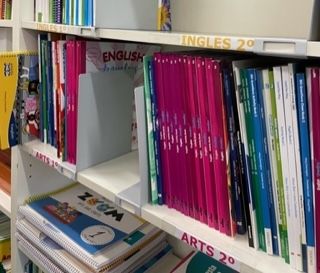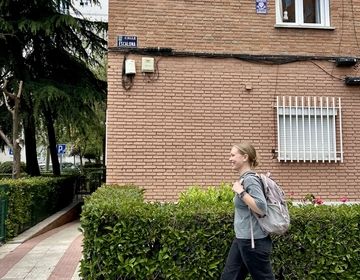5 Things to Know About Teaching in Spain as an Auxiliar de Conversación
Whether you have past teaching experience or not, we all have an idea of what education looks like based on our own time in the classroom. However, school in Spain can look pretty different from what we're accustomed to in the U.S. Thankfully, CIEE Teach Abroad did a great job at making me aware of some of these differences before I began working as an auxiliar de conversación. But there were still a lot of differences that I didn’t discover until I actually began teaching in Spain.
How did I become a Language and Culture Assistant in Spain?
After much research, I am teaching English in Spain through the CIEE Teach Abroad Program. I am currently living and working in the Community in Madrid, where I teach English at the primary school level. My time in Spain has been so rewarding, and I love getting to watch my students learn and grow every day. Even though I’m not planning on working as a teacher when I return to the U.S., my experience here has been eye-opening and I’ve gained so much valuable cultural perspective.
5 Things to Know About Teaching in Spain as an Auxiliar de Conversación
Before you move to Spain to teach English, there are some essential things you should know about the job.

1. Teachers And Students Have A More Casual Relationship
One of the first things I noticed when I started teaching in Spain was that the students called all of their teachers by their first names. I know that this is a common practice in some parts of the U.S., but where I grew up in New England, it was considered completely unacceptable to refer to a teacher by their first name.
Additionally, students and teachers are typically a lot more physically affectionate with each other. This might seem slightly inappropriate from an American point of view, but the Spanish are simply more affectionate in general, and to them, it is totally normal. In fact, this has become one of my favorite parts of Spanish culture.

2. Discipline Can Look A Little Different
I’ve found that Spaniards can be a loud, rowdy bunch, and this often makes for unruly classes. In the states, I recall my teachers taking classroom management very seriously, and they each had different methods to keep their classes attentive and on task. From my experience, classroom management in Spain can vary heavily from teacher to teacher, and some simply teach over the chaos instead of trying to control their class.
This can be frustrating and overwhelming as an auxiliar de conversación, especially when our role as authority figures is a little less concrete. If this becomes a constant issue while you’re teaching, you can always communicate with your teacher and try to find a way to better manage the class together.

3. Longer Break Time!
While this can vary from school to school, my school gives students and staff two hours to enjoy lunch every day. This was mind-blowing coming from America, where even 30 minutes can seem like a generous amount of time. Spanish people use their meals as a chance to sit, relax and thoroughly enjoy their food or coffee. While the American in me initially felt like this was a bit of a waste of time, I’ve come to enjoy the slower-paced mealtimes in Spain. I love getting to chat with my coworkers and relax a bit.

4. You’ll Need to Brush up on British English
In Spain, British English is often what is formally taught in the classroom and students’ big exams are facilitated through Cambridge University or Oxford University. While American English isn’t that different, there are certain words, phrases, and grammatical structures that we don’t use as often or in the same context as our British counterparts. I recommend making sure you’re familiar with British English and that you consult the students’ textbooks to ensure that you’re teaching them the vocabulary and grammar they’ll be tested on. However, don’t be afraid to also share how we say things in America!

5. You’ll Probably Teach Additional Subjects in English
In bilingual schools within the Community of Madrid, other subjects such as science, social studies, and even physical education can be taught in English. Be prepared to see some of those classes on your schedule if you end up with a placement at one of these schools. You might have to refresh yourself on the information, especially the pronunciations and definitions of more technical words. As an auxiliar de conversación, it’s your job to be the English expert, even when it comes to topics or terms not commonly used in everyday conversation.
While these differences can take some getting used to, they offer a great chance to learn about different ways to educate and to reflect on the education that you received in the United States. One of our jobs as auxiliares is to bring new ideas to the Spanish classroom. Recognizing these differences is key to determining exactly what will be most beneficial to contribute.
Related Posts
What's in My Backpack?
As the days in Madrid get longer and the time I have left here shorter, I’ve begun reflecting on what practical, day-to-day advice I would give to someone moving here... keep reading
Who is Rollguine? All about Me!
Hello and welcome! My name is Rollguine (pronounced Ruh-Jean), but you can call me Morgan. I’m from Lexington, Kentucky. I graduated from Bryan Station High School in 2016 and went... keep reading
Stopped Waiting and Started Exploring the World - Alone
Why travel solo? One traveler shares how a life-changing solo trip after graduation sparked deep self-discovery, freedom, and meaningful connection. Discover why going alone might be the best decision you'll ever make.


